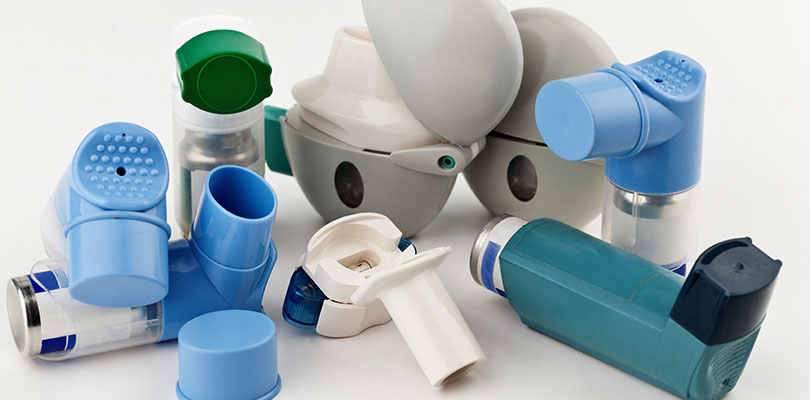
Photo Credit: m-imagephotography / istockphoto.com
Why More Awareness Is Important, and How You Can Help
Every May, when plants bloom and pollen begins to drift, the Asthma and Allergy Foundation of America spreads the word about asthma during National Asthma and Allergy Awareness Month. This is high season for allergy sufferers and asthmatics, and a good time to educate the public about the facts, dangers and research surrounding these extremely common conditions.
You don’t need to wait until May to jump on the asthma awareness bandwagon — there are plenty of reasons to strike up the conversation at any time of year. For the 25.9 million Americans who suffer from asthma and the 50 million who struggle with allergies, the more you can help circulate accurate info, the more likely they are to find the help they need. Here are eight reasons to get started today.
Asthma Can Strike at Any Age, and It's Good to Be Prepared
Although many people experience their first asthma symptoms in childhood, adult-onset asthma is more common than you might imagine. The breathing problems can hit suddenly, and they don’t discriminate; you could be 40, 50 or 60 when you have your first frightening asthma episode.
Knowing which allergens are often to blame, how to react to an asthma attack, and risk factors that can make matters worse will help any adult deal with the problem more efficiently and comfortably. After all, good preparation can mean the difference between a learning experience and a life-threatening emergency.

Photo Credit: DragonImages / istockphoto.com
Advocacy Keeps Policy-Makers Interested
Asthma is a volatile condition that’s affected by many factors and behaviors. Triggers are inside and outside, and symptoms can reach into every corner of life. It follows that public policy can have a pretty big role to play in available treatment options for asthmatics, their safety and general quality of life.
Keeping asthma on the public radar with high-profile campaigns and events on every level will help to get the decision makers and major funders on your side. And the more funds and attention that go to major asthma organizations, the farther their resources can reach.

Photo Credit: bbbrrn / istockphoto.com
More Information Means Less Pressure on the Healthcare System
Asthma accounts for thousands of emergency visits to the hospital, and even more doctor appointments, each year. Although it’s important to be in close contact with your medical team when you live with asthma, a gap in your own understanding can lead you to rely on them more than you need to.
When people don’t realize the control they have over their condition, there’s a good chance they’ll fail to stop an asthma attack before it gets out of hand. In turn, millions of people wind up in the hospital for several days to bring their symptoms under control. Not only does each hospital stay demand lots of resources, it puts sufferers at risk of other complications and infections, too.

Photo Credit: KatarzynaBialasiewicz / istockphoto.com
Better Understanding Saves Lives
The easier it is to recognize the dangers, symptoms, and rescue protocol surrounding asthma, the more likely sufferers can spot and treat the danger early. This is especially helpful when children are at risk: since childhood asthma emergencies can quickly escalate into life-threatening events, it’s important for adults to know what to do at the first sign of trouble.
But the same goes for any person of any age — when strangers and bystanders know how best to react to a breathing emergency, an asthmatic is much less likely to suffer dire consequences. People helping people makes for a healthier and happier community.
Why is asthma worse at night? The reasons why your asthma may get worse at night could be due to sleep position, hormones, allergies or temperature.

Photo Credit: kzenon / istockphoto.com
Further the Case for Environmental Protection
Asthma and allergies are directly tied to air quality: smog, pollution and toxic fumes are some of the most dangerous and widespread triggers out there. Of course, these pollutants aren’t good for anyone, and the health of the planet counts on living more environmentally-friendly lives.
Unfortunately, more people than ever before are suffering from asthma, and though this is bad news for sufferers, the statistics can help to fuel the movement against big polluters. As the number of people who struggle to breathe in dirty air and clouds of carbon grows, it becomes impossible for those in positions of authority to ignore how poor environmental practices are impacting society.

Photo Credit: masaltof / istockphoto.com
Help Get New, Targeted Medications on the Market
The more asthma stays in the spotlight — along with the pros and cons of current asthma treatments — the more likely new research will continue to improve understanding and uncover new remedies. What does this mean for sufferers? A better chance for a comfortable, symptom-free life.
Fortunately, the medical community has continued to focus efforts on improving asthma treatment, but as more people are diagnosed with asthma, the battle is far from over. Giving a voice to the millions of asthma patients, and clarifying their needs and limitations, will help to keep medical attention on track.

Photo Credit: monkeybusinessimages / istockphoto.com
Enriching Lives With Good, Strong Support
It may be a physical disease, but asthma can bring very emotional consequences. When your lifestyle is limited by a breathing disorder, your social circle, self-image, familial role and career can suffer. In short, asthma can leave you feeling out of touch, helpless and less productive in your life.
Coming together to raise awareness about asthma eliminates the physical and emotional separation. People can not only learn from each other and cooperate to reach a shared goal, but simply showing compassion, empathy and friendship at an event or in an online forum can make a big difference in person’s quality of life — even if it doesn’t alleviate their physical symptoms.
If you want to help but don’t know where to begin, talk to your doctor about local and national asthma advocacy groups. A quick online search should also lead you to a number of organizations that could really use your help, either in person or in a virtual capacity. Remember that even a small gesture can have big returns, especially when you join up with like-minded people.
Childhood asthma is a long-term condition that causes inflammation and constriction or swelling of the airways. Learn more about childhood asthma here.







